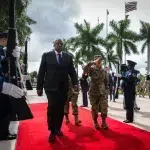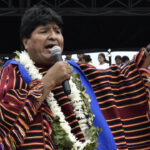The United Nations (UN) organization, through its official Twitter account @ONU_es and its website, published the testimony of Idriss Jazairy, a UN expert in human rights, who has warned that coercion, whether military or economic, should never be used to seek a change of government in a sovereign state, but instead should be promoted a constructive dialogue to find a solution to the crisis in Venezuela.
Sanctions, that can lead to starvation and lack of medicines, are not the answer to the crisis in Venezuela, said the UN special rapporteur on the negative impact of unilateral coercive measures on Thursday in a statement.
The declaration comes after the United States imposed sanctions on Venezuela’s national oil company. “I am especially worried about hearing reports that these sanctions are aimed at changing the Venezuelan government,” said Idriss Jazairy.
For Jazairy, coercion, whether military or economic, should never be used to seek a change of government in a sovereign state. “The use of sanctions by outside powers to overthrow an elected government is in violation of all the norms of international law,” he said.
The rapporteur called on the international community to participate in a constructive dialogue with Venezuela to find solutions to the real challenges it faces. “The economic sanctions are aggravating the already acute crisis affecting the Venezuelan economy, which adds to the damage caused by hyperinflation and the fall in oil prices. This is a moment in which compassion should be expressed for people who suffer so much in Venezuela promoting, not cutting, access to food and medicine,” said Jazairy.
The independent expert stressed that precipitating an economic and humanitarian crisis in Venezuela is not a basis for a peaceful solution and asked the States to reach an agreement to find a path that respects the human rights of Venezuelans.
The perspective of international violence
On the other hand, the expert also said he was “concerned by the reports of serious human rights violations that occur in Venezuela, including an increasing risk of violence and implicit threats of international violence. It is necessary that all parties and all countries work for a peaceful solution that does not lead to more violence.”
Jazairy echoed the comments of the UN Secretary General’s spokesperson, underlining “the urgent need for all relevant actors to participate in an inclusive and credible political dialogue to address the long crisis facing the country, with full respect for the rule of law and human rights.”
The expert recalled that the United Nations Declaration on the principles of international law concerning friendly relations and cooperation among States in accordance with the Charter of the United Nations, urges States to resolve their differences through dialogue and peaceful relations, and avoid the use of economic, political or other measures to coerce another State in relation to the exercise of its sovereign rights.
“I urge all countries to avoid applying sanctions unless it is approved by the United Nations Security Council, as required by the UN Charter,” the special rapporteur concluded.
A Special Rapporteur is an independent expert appointed by the Human Rights Council to examine and report on the situation in a country or a specific human rights issue. This position is honorary and the expert is not a United Nations staff member or paid for his work. Special rapporteurs are part of the special procedures of the Human Rights Council.
Translated by JRE/AR
- orinocotribunehttps://orinocotribune.com/author/orinocotribune/
- orinocotribunehttps://orinocotribune.com/author/orinocotribune/
- orinocotribunehttps://orinocotribune.com/author/orinocotribune/
- orinocotribunehttps://orinocotribune.com/author/orinocotribune/
Share this:
- Click to share on Twitter (Opens in new window)
- Click to share on Facebook (Opens in new window)
- Click to share on LinkedIn (Opens in new window)
- Click to share on WhatsApp (Opens in new window)
- Click to share on Reddit (Opens in new window)
- Click to share on Telegram (Opens in new window)
- Click to email a link to a friend (Opens in new window)






